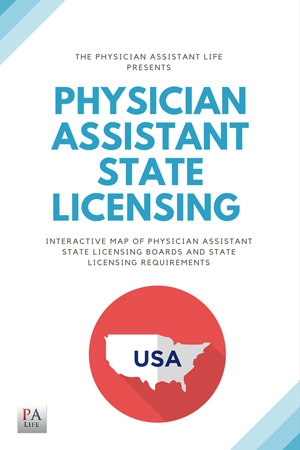 As a freshly minted new graduate PA there are four steps you have to complete to move successfully from program to practice:
As a freshly minted new graduate PA there are four steps you have to complete to move successfully from program to practice:
- Become nationally certified (by the NCCPA via the PANCE)
- Obtain a state license in the state you wish to practice
- Obtain an NPI number
- Obtain a federal DEA number
As a practicing PA, you must renew your current PA license.
Today we are going to look at #2 in this list: obtaining (and renewing) a physician assistant license in the state you wish to practice.
The process starts with your state licensing board.
Interactive map of physician assistant state licensing boards
- Alabama
- Alaska
- American Samoa
- Arizona
- Arkansas
- California
- Colorado
- Connecticut
- Delaware
- District of Columbia
- Florida
- Georgia
- Guam
- Hawaii
- Idaho
- Illinois
- Indiana
- Iowa
- Kansas
- Kentucky
- Louisiana
- Maine
- Maryland
- Massachusetts
- Michigan
- Minnesota
- Mississippi
- Missouri
- Montana
- Nebraska
- Nevada
- New Hampshire
- New Jersey
- New Mexico
- New York
- North Carolina
- North Dakota
- Ohio
- Oklahoma
- Oregon
- Pennsylvania
- Puerto Rico
- Rhode Island
- South Carolina
- South Dakota
- Tennessee
- Texas
- Utah
- Vermont
- Virgin Islands
- Virginia
- Washington
- West Virginia
- Wisconsin
- Wyoming
Statutory and Regulatory Requirements for Initial Licensure and License Renewal
All states require that:
- PAs graduate from an accredited PA program and
- Pass the PANCE
Not all states require you have NCCPA certification to get your state license.
The chart below indicates PA licensure requirements in each state and the District of Columbia. Initial requirements apply to the initial license sought in a jurisdiction and are found in the first three columns following the jurisdiction.
License renewal requirements are found in the final column. Nearly every jurisdiction requires either a minimum number of continuing medical education (CME) hours, current certification by National Commission on Certification of Physician Assistants (NCCPA), or both as a condition of license renewal.
Some jurisdictions impose additional requirements for applicants who have had an extended break from clinical practice. For these provisions, check the state licensing authority Web site.
| wdt_ID | Jurisdiction | Graduate From Accredited PA Program | Passage of NCCPA Exam (PANCE) | Current NCCPA Certification | Renewal Requirements |
|---|---|---|---|---|---|
| 1 | Alabama | X | X | CME | |
| 2 | Alaska | X | X | X | NCCPA |
| 3 | Arizona | X | X | X | CME |
| 4 | Arkansas | X | X | CME | |
| 5 | California | X | X | CME OR NCCPA | |
| 6 | Colorado | X | X | ||
| 7 | Connecticut | X | X | X | NCCPA |
| 8 | Delaware | X | X | CME | |
| 9 | District of Colombia | X | X | CME | |
| 10 | Florida | X | X | CME | |
| 11 | Georgia | X | X | CME | |
| 12 | Hawai | X | X | X | NCCPA |
| 13 | Idaho | X | X | X | NCCPA |
| 14 | Illinois | X | X | X | |
| 15 | Indiana | X | X | X | NCCPA |
| 16 | Iowa | X | X | CME | |
| 17 | Kansas | X | X | CME | |
| 18 | Kentucky | X | X | X | NCCPA |
| 19 | Louisiana | X | X | X | NCCPA |
| 20 | Maine | X | X | X | CME |
| 21 | Maryland | X | X | CME | |
| 22 | Massachusetts | X | X | CME | |
| 23 | Michigan | X | X | ||
| 24 | Minnesota | X | X | CME OR NCCPA (RX) | |
| 25 | Mississippi | X | X | X | CME |
| 26 | Missouri | X | X | X | CME |
| 27 | Montana | X | X | NCCPA | |
| 28 | Nebraska | X | X | CME OR NCCPA | |
| 29 | Nevada | X | X | X | CME |
| 30 | New Hampshire | X | X | X | NCCPA |
| 31 | New Jersey | X | X | CME | |
| 32 | New Mexico | X | X | X | NCCPA (CME FOR DEA) |
| 33 | New York | X | X | INECTION CONTROL TRAINING | |
| 34 | North Carolina | X | X | CME | |
| 35 | North Dakota | X | X | CME AND NCCPA | |
| 36 | Ohio | X | X | X | NCCPA (CME FOR RX) |
| 37 | Oklahoma | X | X | CME | |
| 38 | Oregon | X | X | NCCPA FOR SCH.II RX | |
| 39 | Pennsylvania | X | X | X | NCCPA |
| 40 | Rhode Island | X | X | CME | |
| 41 | South Carolina | X | X | X | NCCOA |
| 42 | South Dakota | X | X | CME OR NCCPA | |
| 43 | Tennessee | X | X | CME OR NCCPA | |
| 44 | Texas | X | X | X | CME |
| 45 | Utah | X | X | CME OR NCCPA | |
| 46 | Vermont | X | X | CME OR NCCPA | |
| 47 | Virginia | X | X | X | NCCPA |
| 48 | Washington | X | X | CME OR NCCPA | |
| 49 | West Virginia | X | X | X | NCCPA |
| 50 | Wisconsin | X | X | X | |
| 51 | Wyoming | X | X | X | NCCPA |
| Jurisdiction | Graduate From Accredited PA Program | Passage of NCCPA Exam (PANCE) | Current NCCPA Certification | Renewal Requirements |
You Must Pay to Play
Every state has their own rules, their own set of fees, process and timeline for application and renewal.
- Arizona, for example, has a $125 application fee and a $370 license fee.
- Texas has a $220 licensure fee as well as a registration fee of $276 good for 12 months. Here is an example of their online application.
Remember, these fees are going to be on top of your $731 DEA license fee which must be renewed every three years and an NCCPA certification maintenance fee of $150 every two years.
You can talk to your employer about covering some of these expenses, and it may be something worth discussing before you sign the contract.
The entire process usually takes 2-3 months to complete, so you want to get started early.
License Renewals
In my home state of California, the renewal fee is $300 and is paid on a recurring basis every two years.
It is illegal to practice as a physician assistant with an expired license.
Approximately ten weeks prior to the expiration date of your physician assistant license, a renewal notice will be mailed via U.S. mail to your address of record.
You are responsible for renewing your license even if you don’t receive a renewal notice. There are usually two options for license renewal, by mail or online.
Failure to Renew
Practicing as a physician assistant without a renewed license may lead to disciplinary action against your license.
There is usually no renewal grace period. Licenses not renewed by the expiration date are considered "delinquent."
After a license has been in "delinquent" status for five years, the license is automatically canceled. A canceled license may not be reactivated by simply paying delinquent fees and penalties. The physician assistant must apply for a new license and meet the current licensure requirements.















Hello!
I just wanted to reach out and say your PANCE/PANRE review is amazing! I took my second recertification exam a little over a year ago and used your Podcast to study, along with a class. I did better on that exam, after using your study method, than I did on my first exam right after PA school! Your podcast totally prepared me in a way that the 5 day prep class alone did not. I walked out confident and was so amazed that I beat both my PANCE and previous PANRE scores by a lot. And I’ve been in Dermatology my entire career…so the fear of Cardio, Pulmonary, etc. is real! I recommend this to every student I mentor or PA I meet that is taking their boards! Thank you!
You are amazing, Stephanie!
Thank’s so much for your kind words and all your support. It means the absolute world tom me! Congratulations on your success!!
Warmly,
Stephen Pasquini PA-C
I completely disagree. There is ZERO evidence and proof for us to keep taking the boards again and again. This is not about our knowledge nor about quality of care. This will prove this any time when the NCCPA decides to make us take them for free. The NCCPA and all they want is our money. The NCCPA has done nothing for us. We deserve to go and a complete accounting where is our money and salaries. You should look every board members and look at their own states, none of them even require their own state to be re certified. This is a complete scam and we should push to get rid of the NCCPA They are worthless
You certainly are not alone in your feelings regarding recertification, Tim. I used to be part of the Q6-year recertification cycle and have taken the PANRE 3 times! (Yuk!!) It’s never fun, and as you mentioned, it is a costly, stressful, (and timely) endeavor. Every time I prepare for the PANRE, I must admit that it is a refresher of many of the topics I have forgotten over the years. I am unsure if that has ever translated directly into better patient care, but I have found myself having a better appreciation for ABGs and heart murmurs! And I am sure you agree that the review that comes with recertification is much different than what we learn while attending a CME conference or with self-study CME. With the advent of the new PANRE-LA, it looks as though there is zero intention from the NCCPA to remove the recertification process (and why would they?) only to make it a bit more accessible. It would be nice to have evidence showing that recertification testing improves patient outcomes. According to the NCCPA, the evidence is there, which the AAPA disputes. The AAPA has expressed a desire in the past to eliminate the recertification exam. So, who knows, maybe that day is coming in the next 10-15 years.
P.S. I did find this article from 2016 from the South Carolina Academy of PAs that you may find interesting: https://www.scapapartners.org/news/272567/NCCPA-Update-on-Recertification-Process-.htm
Stephen Pasquini PA-C
Hi
I’m in Nyc and I’m changing jobs. How do I change my supervising physician for my license?
Beside license and malpractice, is there anything else that needs to be changed?